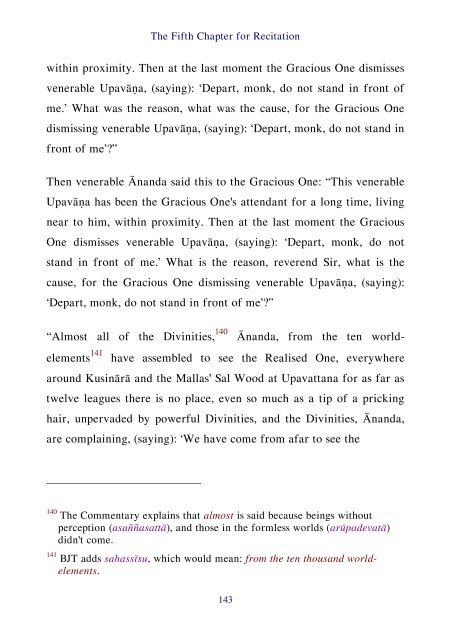The Discourse about the Great Emancipation
An English translation of one of the longest discourses in the canon, detailing the last year of the Buddha’s life, and his final teachings (Mahāparinibbānasuttaṁ, DN 16)
An English translation of one of the longest discourses in the canon, detailing the last year of the Buddha’s life, and his final teachings (Mahāparinibbānasuttaṁ, DN 16)
You also want an ePaper? Increase the reach of your titles
YUMPU automatically turns print PDFs into web optimized ePapers that Google loves.
<strong>The</strong> Fifth Chapter for Recitation<br />
within proximity. <strong>The</strong>n at <strong>the</strong> last moment <strong>the</strong> Gracious One dismisses<br />
venerable Upavāṇa, (saying): ‘Depart, monk, do not stand in front of<br />
me.’ What was <strong>the</strong> reason, what was <strong>the</strong> cause, for <strong>the</strong> Gracious One<br />
dismissing venerable Upavāṇa, (saying): ‘Depart, monk, do not stand in<br />
front of me’?”<br />
<strong>The</strong>n venerable Ānanda said this to <strong>the</strong> Gracious One: “This venerable<br />
Upavāṇa has been <strong>the</strong> Gracious One's attendant for a long time, living<br />
near to him, within proximity. <strong>The</strong>n at <strong>the</strong> last moment <strong>the</strong> Gracious<br />
One dismisses venerable Upavāṇa, (saying): ‘Depart, monk, do not<br />
stand in front of me.’ What is <strong>the</strong> reason, reverend Sir, what is <strong>the</strong><br />
cause, for <strong>the</strong> Gracious One dismissing venerable Upavāṇa, (saying):<br />
‘Depart, monk, do not stand in front of me’?”<br />
“Almost all of <strong>the</strong> Divinities, 140 Ānanda, from <strong>the</strong> ten worldelements<br />
141 have assembled to see <strong>the</strong> Realised One, everywhere<br />
around Kusinārā and <strong>the</strong> Mallas' Sal Wood at Upavattana for as far as<br />
twelve leagues <strong>the</strong>re is no place, even so much as a tip of a pricking<br />
hair, unpervaded by powerful Divinities, and <strong>the</strong> Divinities, Ānanda,<br />
are complaining, (saying): ‘We have come from afar to see <strong>the</strong><br />
140 <strong>The</strong> Commentary explains that almost is said because beings without<br />
perception (asaññasattā), and those in <strong>the</strong> formless worlds (arūpadevatā)<br />
didn't come.<br />
141 BJT adds sahassīsu, which would mean: from <strong>the</strong> ten thousand worldelements.<br />
143


















